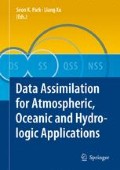Abstract
In this study, the optimal parameter estimation is performed for both physical and computational parameters in a mesoscale meteorological model, and its impact on the quantitative precipitation forecasting (QPF) is assessed for a heavy rainfall case occurred at the Korean peninsula in June 2005. Experiments are carried out using the PSU/NCAR MM5 model and the genetic algorithm (GA) for two parameters: the reduction rate of the convective available potential energy in the Kain-Fritsch (KF) scheme for cumulus parameterization, and the Asselin filter parameter for numerical stability. The fitness function is defined based on a QPF skill score. It turns out that each optimized parameter significantly improves the QPF skill. Such improvement is maximized when two optimized parameters are used simultaneously. Our results indicate that optimizations of computational parameters as well as physical parameters and their adequate applications are essential in improving model performance.
Access this chapter
Tax calculation will be finalised at checkout
Purchases are for personal use only
Preview
Unable to display preview. Download preview PDF.
References
Aksoy A, Zhang F, Nielsen-Gammon JW (2006), Ensemble-based simulations state and parameter estimation with MM5. Geophys Res Lett 33:L12801, doi:10.1029/2006GL026186
Asselin R (1972) Frequency filter for time integrations. Mon Wea Rev 100:487–490
Barth NH (1992) Oceanographic experiment design II: Genetic algorithms. J Atmos Oceanic Technol 9: 434–443
Bryan GH, Fritsch JM (2000) Unphysical thermodynamic structures in explicitly simulated thunderstorms. 10th PSU/NCAR Mesoscale Model User’s Workshop, Boulder, CO, NCAR, Available from http://www.mmm.ucar.edu/mm5
Charbonneau P (2002) An introduction to genetic algorithms for numerical optimization. NCAR Tech Note TN-450+IA, 74pp
Deb K (2000) An efficient constraint handling method for genetic algorithm. Comput Methods Appl Mech Eng 186:311–338
Dudhia J (1989) Numerical study of convection observed during the winter monsoon experiment using a mesoscale two dimensional model. J Atmos Sci 46:3077–3108
Dudhia J (1996) A multi-layer soil temperature model for MM5. Preprints, Sixth PSU/NCAR Mesoscale Model User’s Workshop, Boulder, CO, NCAR, 49–50
Goldburg D (1989) Genetic algorithms in search, optimization and machine learning. Addison-Wesley, Reading, MA, 432pp
Grell GA, Dudhia J, Stauffer DR (1994) A description of the fifth-generation Penn State/NCAR Mesoscale Model (MM5). NCAR Tech. Note TN-398${+}$STR, 138pp
Hernandez F, Traon R-Y, Barth NH (1995) Optimizing a drifter cast strategy with genetic algorithm. J Atmos Oceanic Technol 12:330–345
Holland J (1975) Adaptation in natural and artificial systems. University of Michigan Press, Ann Arbor, 228pp
Hong S-Y (2004) Comparison of heavy rainfall mechanisms in Korea and the Central US. J Meteor Soc Japan 5:1469–1479
Hong S-Y, Pan HL (1996) Nonlocal boundary layer vertical diffusion in a medium-range forecast model. Mon Wea Rev 124:2322–2339
Jackson C, Sen MK, Stoffa PL (2004) An efficient stochastic Bayesian approach to optimal parameter and uncertainty estimation for climate model predictions. J Climate 17:2828–2841
Kain J (2003) The Kain-Fritsch convective parameterization: An update. J Appl Meteoro 43:170–181
Lee D-K, Kim H-R, Hong S-Y (1998) Heavy rainfall over Korea during 1980–1990. Korean J Atmos Sci: 1:32–50
Navon IM (1997) Practical and theoretical aspects of adjoint parameter estimation and indetifiability in meteorology and oceanography. Dyn Atmos Ocean 27:55–79
Park SK, Droegemeier KK (1999) Sensitivity analysis of a moist 1D Eulerian cloud model using automatic differentiation. Mon Wea Rev 127:2180–2196
Saito K, Fujita T, Yamada U, Ishida J-I, Kumagai Y, Aranami K, Ohmori S, Nagasawa R, Kumagai S (2006) The operational JMA nonhydrostatic mesoscale model. Mon Wea Rev 134:1266–1298
Schaefer JT (1990) The critical success index as indicator of warning skill. Wea Forecast 5:570–575
Schultz P (1995) An explicit cloud physics parameterization for operational numerical weather prediction. Mon Wea Rev 123:3331–3343
Severijns CA, Hazeleger W (2005) Optimizing parameters in an atmospheric general circulation model. J Climate 18:3527–3535
Zhu Y, Navon IM (1999) Impact of parameter estimation on the performance of the FSU global spectral model using its full-physics adjoint. Mon Wea Rev 127:1497–1517
Author information
Authors and Affiliations
Editor information
Editors and Affiliations
Rights and permissions
Copyright information
© 2009 Springer-Verlag Berlin Heidelberg
About this chapter
Cite this chapter
Lee, Y.H., Park, S.K., Chang, DE., Ha, JC., Lee, HS. (2009). Parameter Estimation Using the Genetic Algorithm in Terms of Quantitative Precipitation Forecast. In: Park, S.K., Xu, L. (eds) Data Assimilation for Atmospheric, Oceanic and Hydrologic Applications. Springer, Berlin, Heidelberg. https://doi.org/10.1007/978-3-540-71056-1_11
Download citation
DOI: https://doi.org/10.1007/978-3-540-71056-1_11
Publisher Name: Springer, Berlin, Heidelberg
Print ISBN: 978-3-540-71055-4
Online ISBN: 978-3-540-71056-1
eBook Packages: Earth and Environmental ScienceEarth and Environmental Science (R0)

